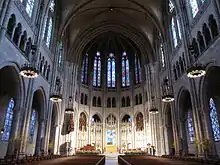Harry Wright Goodhue (1905–1931) was a stained glass artist whose work is featured in churches throughout the United States. During his short career he designed windows for over thirty churches.[1]
Background and family
Goodhue was born in Cambridge, Massachusetts and the eldest son of Boston stained glass artist Harry Eldredge Goodhue and Mary Louise Wright Goodhue. Wright received his early training in his father's Boston studio and in children's art classes at the Boston Museum of Fine Art. In 1921, Wright left school to work as an office boy and later as a draftsman in the architectural firm of Allen & Collens, where he designed his first stained glass windows including a chancel window for a church designed by his uncle Bertram G. Goodhue. Wright later studied for two years at Harvard University, where he wrote a thesis on aesthetics. In 1930 he married writer Cornelia Evans and they lived in Greenwich Village. He died in 1931 at the early age of 26.[2][3][4]
Works

In 1924, he and his mother (who is credited with a window at the First Parish Church, Brookline[5]) opened their own Boston studio. His commissions included windows for churches by well-known architects such as Ralph Adams Cram, Bertram G. Goodhue, Allen & Collens, and William P. Hutchins. Some of Wright's window designs were shown at the Tricentennial Exhibition of the Boston Society of Arts and Crafts in 1927.
- Second Universalist Church (Boston)
- Christ Church Cranbrook, (Bloomfield Hills, Michigan)[6]
- Sacred Heart Church (Jersey City)[7][8] (transept and rose windows), 1923
- Saint James Church (Wilkinsburg, Pennsylvania)[9]
- Congregational Church (Montclair, New Jersey). 1920[10]
- Trinity English Lutheran Church (Fort Wayne, Indiana)[11]
- Emmanuel Episcopal Church (La Grange, Illinois) (Life of Christ window)[12]
- Riverside Church (New York) (apse)
- All Souls Memorial Episcopal Church (Washington, DC) 1929 (resurrection window)[13]
- Pine Street Presbyterian Church (Harrisburg, Pennsylvania)[14]
- Holy Rosary R. C. Church, (Homewood, Pennsylvania) (façade rose) 1928-30
- Calvary Episcopal Church, (East Liberty, Pittsburgh, Pennsylvania) (Great Commission)
- St. Paul's Episcopal Church (Winston-Salem, NC), 1928. (east window at high altar)
References
- ↑ "Harry e. Goodhue".
- ↑ "Michigan Stained Glass Census".
- ↑ Harry Wright Goodhue at archINFORM
- ↑ Albert M. Tannler, "Harry Wright Goodhue: Stained Glass of Unsurpassed Distinction and Rare Beauty," Stained Glass Quarterly (2004)
- ↑ "Guide to Stained Glass at First Parish in Brookline - Unitarian Universalist". Archived from the original on 2014-09-11. Retrieved 2014-09-11.
- ↑ Kathryn Bishop Eckert, The Campus Guide: Cranbrook Princeton Architectural Press (2001)
- ↑ "Dreaming in Technicolor". Architectural Media. Retrieved 2014-08-21.
- ↑ Gomez, john (2008). "Sacred Heart Church in Jersey City, New Jersey A HISTORY AND ANALYSIS OF RALPH ADAMS CRAM'S SEMINAL SPANISH GOTHIC MASTERWORK" (PDF). Columbia University. Archived from the original (PDF) on 2014-05-10. Retrieved 2014-08-20.
{{cite journal}}: Cite journal requires|journal=(help) - ↑ "Stained Glass Windows – St. James Catholic Church". Archived from the original on 2014-09-11. Retrieved 2014-09-11.
- ↑ Nowicki, Susan A. (1998), Montclair, New Jersey: The Development of a Suburban Town and Its Architecture, ISBN 9780549538752
- ↑ "405 West Wayne Street | West Central Neighborhood Association". Archived from the original on 2014-09-12. Retrieved 2014-09-11.
- ↑ "Error" (PDF).
- ↑ "The Centennial: 1911–2011" (PDF). All Souls Memorial Episcopal Church. Retrieved 2014-09-11.
- ↑ "Christ in Glory | Pine Street Presbyterian Church Christ in Glory |". Archived from the original on 2014-09-12. Retrieved 2014-09-11.